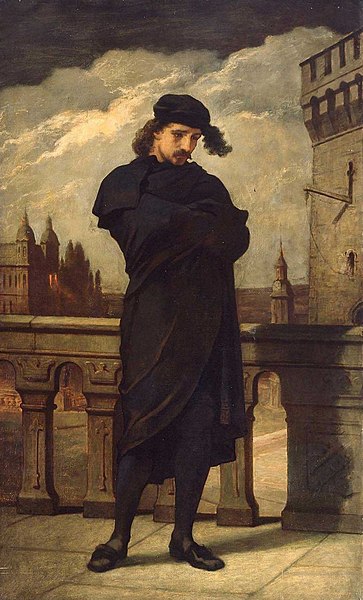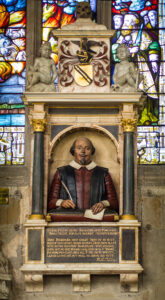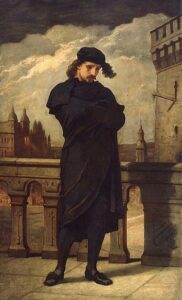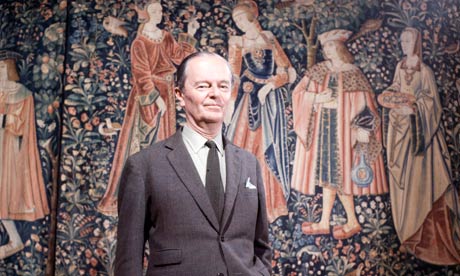William Shakespeare was also a ‘man of his time’, in that his plays were performed at the London Globe. Compare this with the wretched lives of the ‘men against their time’: so ignored that, in their isolation, they usually suffer psychic annihilation (as would happen to Nietzsche).
On a mainstream television channel last century I caught glimpses of what appeared to be a series of Shakespeare’s complete works. Each drama, comedy or tragedy was performed by native actors—naturally all ethnically pure English—and I was so impressed by the more than beautiful euphony and musicality of Shakespearean English that I immediately fell in love and understood why his poetry represents one of the pinnacles of European art.
Alas, in this century, the last time I visited London, I went to Shakespeare’s Globe to see a performance of Antony and Cleopatra and… I received a horrifying shock: unlike the beautiful images I had seen on television in the previous century, now not only was the casting of the Shakespearean tragedy at the Globe itself replete with blacks, but an Arab was fondling his English girlfriend in the audience!
It is events of this kind that make one abandon the classics and devote oneself to Hitler with the utmost fanaticism! While I can recognise the very high culture represented by the English poet’s theatre, what is the point of being immersed in his dramas if what prevails in England today is the ethnosuicidal tragedy of astronomic self-hatred of the English themselves? I was a tourist in London when this happened, and it should be no surprise that Tyrone Joseph Walsh, mentioned in my previous article, vehemently refused to accompany me to the Globe.
Now Tyrone is rotting in jail for rebelling against his country’s vehement ethnosuicide. Only now do I fully understand why one loses all interest in one’s country’s greatest literary figure when things like what happened to me at the Globe happen.
So, sharing the disinterest of the friend who is now unable to communicate with us, I shall confine myself in this entry to re-posting what I have written in previous years about Shakespeare’s best-known tragedy:
______ 卐 ______
Of my list of fifty, this was the first film that, as I recount in my autobiography, really made an impression on me when I saw it on television in 1975, with my dad by my side. Precisely in trying to understand how a defect or fault in my father’s character corrupted the whole family dynamics, years later I would ponder much in the words that, in Laurence Olivier’s voice, we listen at the beginning of Hamlet (1948 film):
So oft it chances in particular men
That for some vicious mole of nature in them,
By the o’ergrowth of some complexion,
Oft breaking down the pales and forts of reason,
Or by some habit grown too much; that these men–
Carrying, I say, the stamp of one defect,
Their virtues else — be they as pure as grace,
Shall in the general censure take corruption
From that particular fault.
As a teenager watching it at home, I was most impressed by Hamlet’s inward-spiralling soliloquies in one of the early scenes, when he is left alone in the hall and the court guests leave. If instead of the forty-year-old actor Olivier, the director had cast a teenage actor of my age—as he appears in Shakespeare’s tragedy!—I would have connected much more with the character. But even so, his soliloquies near the beginning of the film made a big impression on me because that is what I used to do as a teenager, and precisely because of a family tragedy that no one but me seemed to have any introspection about.
However, it is impossible to critique the film without critiquing not only Shakespeare, but the Christian era of which both Shakespeare and I are a part.
As Alice Miller observed in one of her books, the Judeo-Christian commandment to honour the parent has been fatal to the mental health of Christians (and I would add, of atheistic neochristians alike). Although Christians destroyed the vast majority of the classical world’s plays, tragedies and comedies, in the little that remains it can be seen that in both Iphigenia and Electra it’s clear that there is maddening mistreatment of their children by their parents. But not in Hamlet where an uncle is the bad guy. Nevertheless, for the Elizabethan period Hamlet was a breakthrough in the right direction, although millennia earlier the Greeks had already reached the marrow of the human soul. In sum, for the time Hamlet definitely represented a leap forward to a more self-conscious self.
 Another thing that, now grown up, struck me when I rewatched the film was the character of Ophelia when Hamlet wants to grab her: the personification of the eternal feminine that I’ve been talking about on this site, which also appears in Shakespeare when we listen: ‘In her excellent white bosom, these…’ Hamlet’s scenes with Ophelia in the castle should be paradigmatic of how women will be in the future ethnostate, and are worth seeing. But back to what I said above.
Another thing that, now grown up, struck me when I rewatched the film was the character of Ophelia when Hamlet wants to grab her: the personification of the eternal feminine that I’ve been talking about on this site, which also appears in Shakespeare when we listen: ‘In her excellent white bosom, these…’ Hamlet’s scenes with Ophelia in the castle should be paradigmatic of how women will be in the future ethnostate, and are worth seeing. But back to what I said above.
Whites won’t mature as long as they are trapped by Judeo-Christian commandments. Even in areas as distinct from racial preservation as mental disorders (in Shakespearean tragedy we read that the teenage Hamlet was said to be deranged), we can never understand each other unless we transvalue our values to the values of the times of the Greek tragedies. Back then, before the commandment to honour our parents, it was easy to see that Clytemnestra’s mistreatment had affected the mental health of her daughter Electra; or that Iphigenia’s sacrifice by Agamemnon had affected Clytemnestra terribly, and so on. Even the tough Spartans wept at these open-air tragedies when they visited Athens because they reflected what was happening in the real world.
So much do Christian ethics permeate the secular world that even in his Dictionnaire philosophique Voltaire says that ‘It is natural for children to honour their parents’, and the so-called mental health professionals of our times feel the same way. In our century, the Judeo-Christian injunction to honour the parent, now secularised, moves writers to shift the villain of the story, for example from father to uncle as in Harry Potter (and Hamlet!) and only through such a shift is audio-visual drama permitted.
To transvalue all values is to recognise that the tragedies of the classical world were more profound and direct than the indirect tragedies of our Christian era. And even though Shakespeare, like Montaigne, set religion aside in their writings, they still moved on the axiological scale of our age, where the mandate to honour the parent is so profound that there is a whole fraudulent profession, psychiatry, which tries to keep the parental figure out in the cases of traumatised children and adolescents at home (cf. my books in Spanish).
Hamlet revisited
Though fictional, Hamlet is a character who, asking himself a thousand questions as he wanders the vast halls of the Danish castle, he also struggles with mental illness. In my article ‘Hamlet’ last year [reposted above], I implied that the Greek tragedians knew the human soul better than the great writers of Christendom for the simple reason that the latter have lived under the sky of the fourth commandment, honour our parents, and that this prevented them from seeing that some parents drive their children mad. This is so true that I commented in that article that even Voltaire hadn’t broken with that Christian commandment (it was not until the 20th and 21st centuries that a Swiss writer, Alice Miller, repudiated such a toxic commandment).
But in this entry I didn’t want to talk about the trauma model of mental disorders. I want to put Shakespeare on par with Goethe in the sense that their most famous works, Faust and Hamlet, contain strong Christian residues. Like Goethe, Shakespeare needs to be contextualised.
What could a continental freethinker do in the mid-16th century during the wars between Catholics and Protestants? Become a recluse. A sceptic of Christianity, Montaigne, did exactly that: something that evokes that many contemporary racialists are now recluses because of social ostracism if they dare to come down from their towers. Montaigne impresses me because he was the true representative of the intellectual side of the Renaissance, in sharp contrast to Erasmus who still lived in the thickest medieval darkness (cf. what I wrote about Erasmus in Daybreak).
England was then freer than Montaigne’s France, and that is the background to understanding William Shakespeare. We know that Shakespeare read Florio’s translations of Montaigne and that he was very impressed by him. Kenneth Clark said that Shakespeare was the first great poet of Christendom without religious beliefs.

Hamlet by William Morris Hunt.
However, like Goethe with his Faust, this is not entirely accurate. Shakespeare’s Hamlet has to be placed within the matrix of Elizabethan England: a time when Christian doctrine was still taken very seriously, both in its Anglican and Papist versions. Hamlet suffered a schizogenic struggle. He struggled internally with the command of his father’s ghost, from purgatory, to avenge him; but Hamlet couldn’t condemn himself, should he commit the mortal sin of murdering his uncle if he was, after all, innocent: a dilemma with which he struggles internally throughout the play.
So despite being influenced by the free-thinking ideas of his time, like Goethe Shakespeare was playing with Christian post-mortem doctrine. Nonetheless, from the viewpoint of my trilogy, which tries to fulfil Delphi’s mandate, Hamlet certainly represents a breakthrough in insight: it is the first foray into what we may call the true self (as opposed to the false self: the internal struggles we read in Augustine’s Confessions).
What gives Hamlet such evocative power is that the tragedy doesn’t take place on stage but within Hamlet’s soul. The whole play is a soliloquy, and since I have finished my trilogy these days with a postscript to my own tragedy with my father, I would like to quote a few words from Hamlet’s second scene:
Would I had met my dearest foe in heaven
Or ever I had seen that day, Horatio!
My father!—methinks I see my father.
A couple of minutes of the 1948 film interpretation from this point onwards portrays Hamlet’s inward-spiralling soliloquies very well. Incidentally, when I saw that film with my father in 1975 he had already mistreated me.








